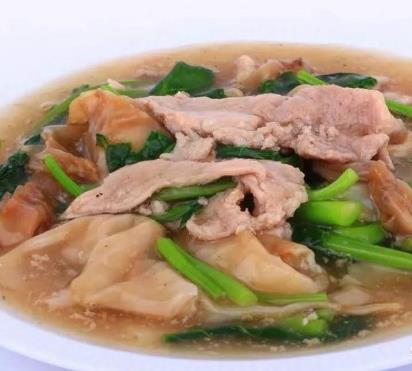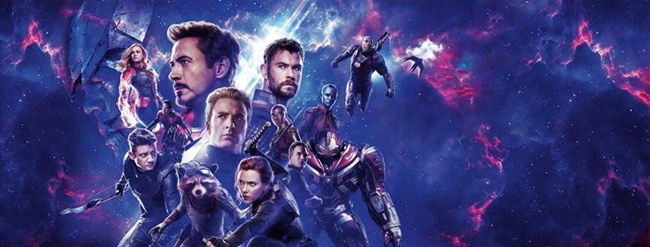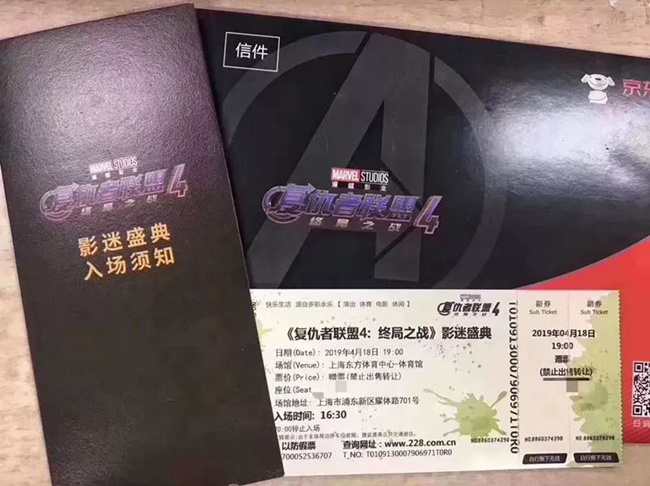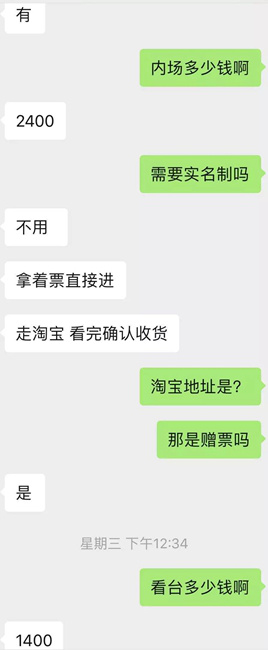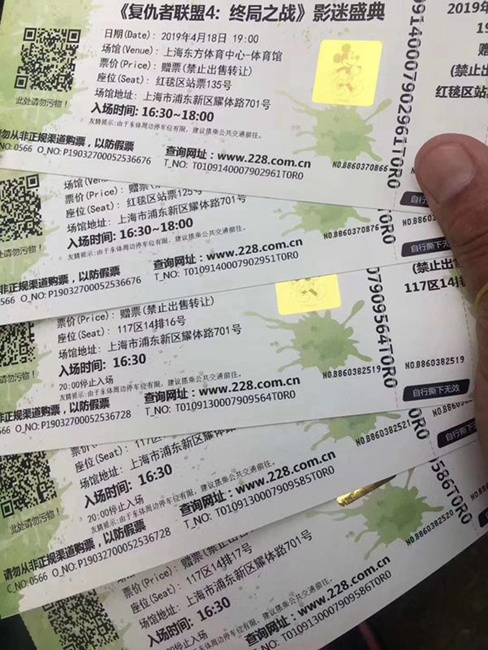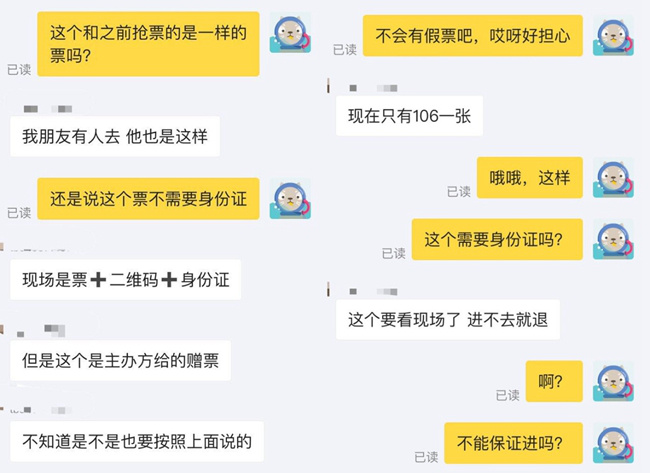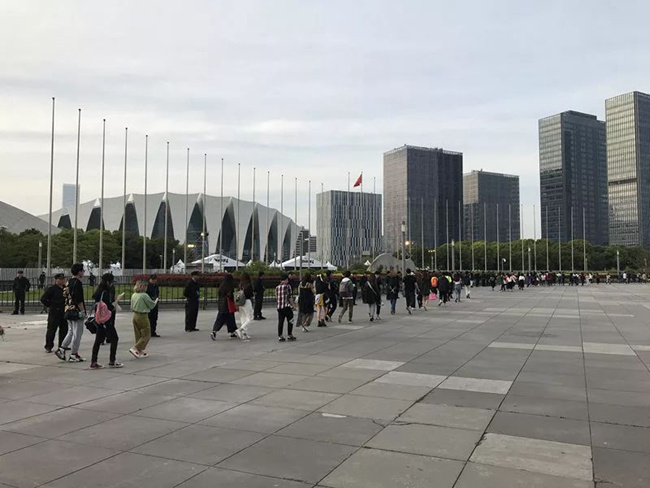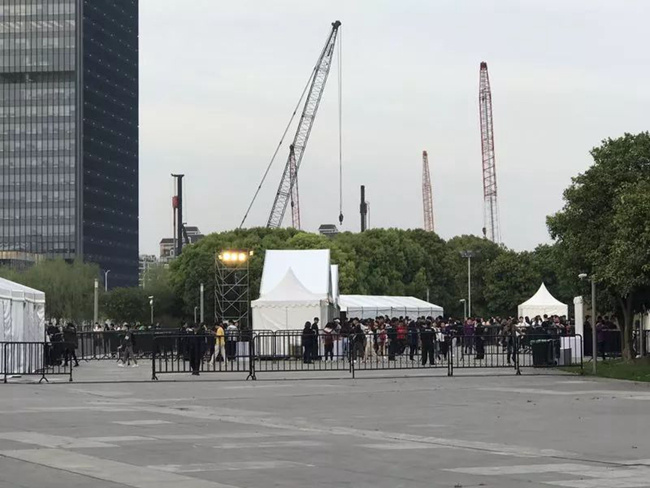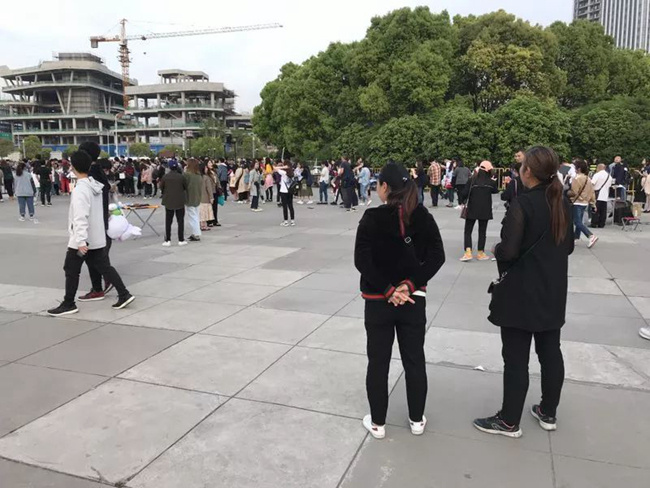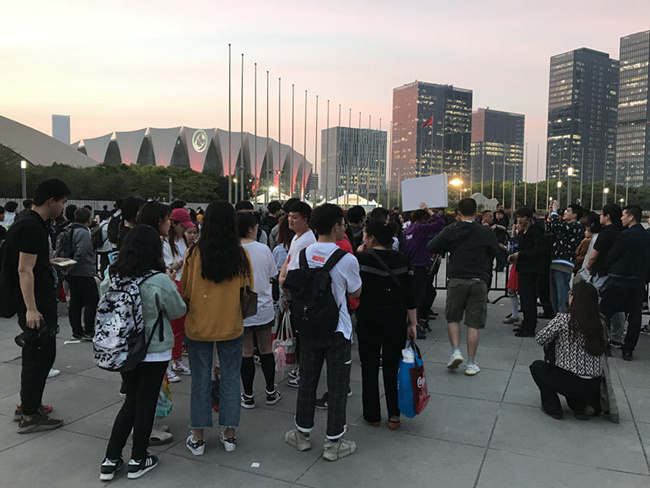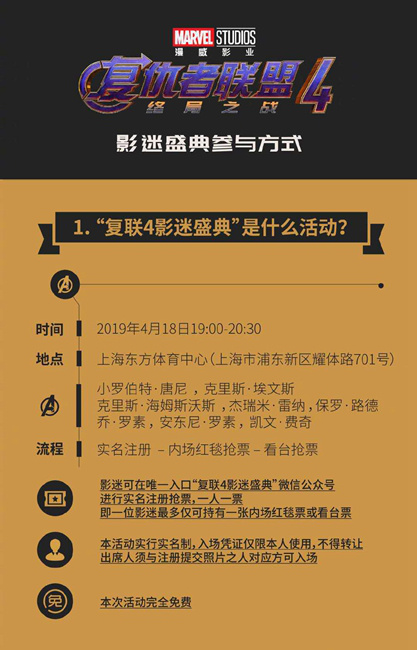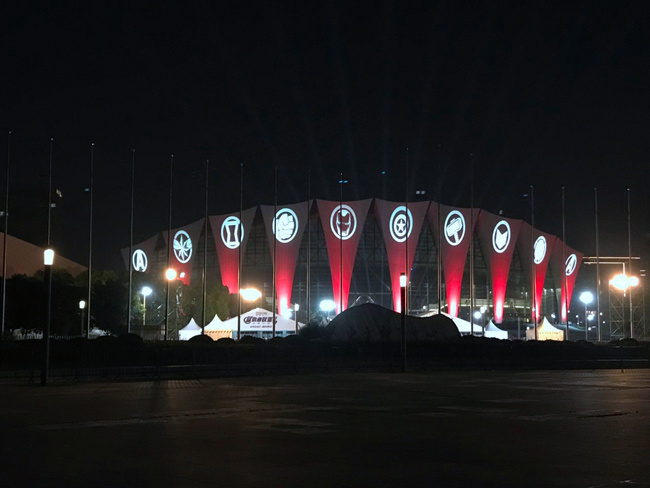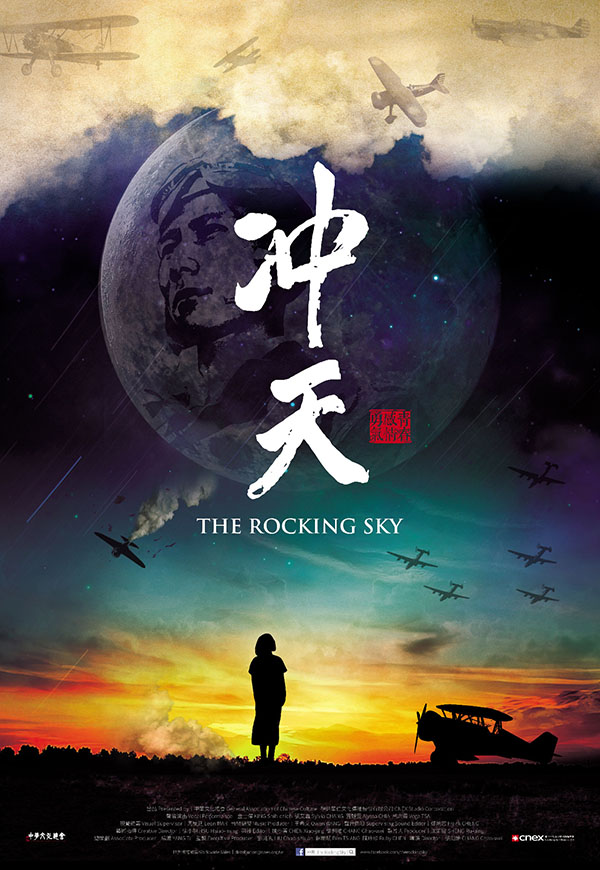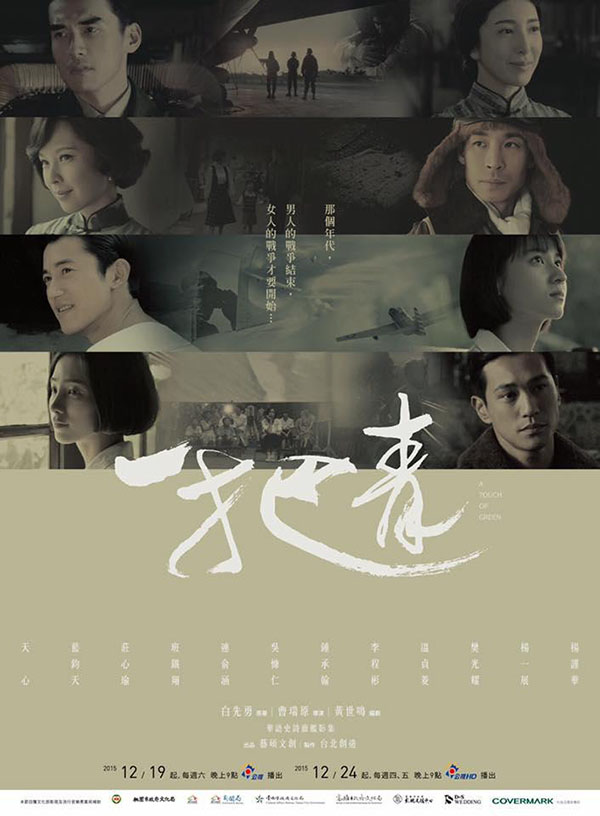Poster of Taiwan Province documentary "Soaring into the Sky" (2015).
Taiwanese drama’s touch of green (2015) poster.
For a long time, there are often only heroes and devils, or heroes and villains, but no one in the war narrative in Chinese-speaking circles. In this narrative, we almost forgot that the war was fought by people. In fact, soldiers, whether friend or foe, like all ordinary people, have some emotions, some dignity, some pride, and a lot of love and concern. In 2015, two video works produced by Taiwan Province-the documentary "Soaring into the Sky" and the TV series "touch of green"-did not stick to the old pattern, which made us see many such ordinary people in the war, and thus let us see the real war, not the myth about it.
The story of "Chongtian" covers the period from the founding of the Kuomintang Air Force to the end of the Anti-Japanese War. Touch of green goes on to tell the story of the Air Force’s journey from the Civil War to its retreat to Taiwan Province. It is almost a historical necessity to "live thousands of tragedies and change a few lines of notes in history" However, these two works run in the opposite direction, re-combing the "love for flying, longing for the sky, and those who hate each other and love each other" from the thin historical notes. Watching "Going to the Sky" is both heartbreaking and exciting, while watching "touch of green" is like being hollowed out bit by bit, and finally you can’t cry or move. During the Anti-Japanese War, the air force’s heroism and tragic look like Phnom Penh embedded in the rumble of war. In the civil war, the same group of people lost their heroism and tragic look. Facing their own rivers and mountains, their own people only saw the distortion and ferocity of the war, and this kind of war is like a mirror that makes people have nowhere to escape, forcing them to look straight at their struggles and even madness.
Both "Soaring into the Sky" and "touch of green" tell the cruelty of war, but the contrast between them shows an extremely profound moral insight: even in a very cruel war, the justice of war purpose (jus ad bellumThe just war recognized in the Charter of the United Nations is only self-defense war and humanitarian intervention authorized by the United Nations) and the justice of war means (jus in belloThe main requirements include prohibiting deliberate attacks on civilians, prohibiting violence against prisoners of war or taking revenge actions, and all the wounded and sick should be cared for and protected; These provisions, mainly concentrated in the Geneva Convention, are still the bottom line of human nature and provide vital protection for people’s natural moral feelings.
I. "Death Training Camp"
After the September 18th Incident, in response to Japan’s full-scale war of aggression against China, the Republic of China established a school for training air force pilots in Jianqiao, Hangzhou (now Jianqiao Town, Jianggan District, Hangzhou) in 1932, namely "Central Aviation School" (hereinafter referred to as "Aviation School"). This is almost a "death training camp", and it’s no secret. Every student approaching the school gate will see the inscription: "Our bodies, planes and bombs should perish together with the enemy, warships and positions." The banner hanging at their graduation ceremony reads: "Strong men will fly in the storm and swear to serve the country and not survive." Yes, for them, death comes quickly. Many of them were shot and crashed while fighting the enemy in the sky.
Others regret it before it soars into the sky. Gao Zhihang, known as the "God of War of the Air Force", learned to fly a plane in France in the 1920s. After returning to China, he worked as an instructor in an aviation school and trained the first generation of China pilots. He shot down several Japanese planes in just three months after the Sino-Japanese war, and was promoted to the position of Colonel Commander of the Air Force Expeller. In November 1937, Gao Zhihang was ordered to go to Lanzhou to receive Soviet aid fighters. After receiving the fighters, according to the order, he led the fighters to fly to Zhoujiakou (now Chuanhui District, Zhoukou City, Henan Province). Stay where you are because of the bad weather. On November 21st, Zhoujiakou Airport received a report that 11 Japanese planes were flying to the airport. He immediately ordered the battle, but by this time the Japanese fighters had flown over the airport. Under the dive bombing of the Japanese plane, Gao Zhihang boarded the plane, and just entered the engine room, he was hit by the shells dropped by the Japanese fighters. When he was killed, his hands were still tightly holding the joystick of the plane, at the age of 30.
They may even die of all kinds of misfortunes. At that time, Liu Cuigang, one of the "Four donkey kong" of the Air Force (the second student of the Aviation School), shot down seven Japanese planes in three months. He is not only a famous flying general, but also an iron bird and an idiot. When pursuing Ms. Xu Xilin, she flew low on the other side’s roof, and she first touched her future mother-in-law by doing flying stunts.
On October 25th, 1937, Liu Cuigang was ordered to lead three planes to cover the Eighth Route Army’s counterattack against Niangziguan. On the 26th, he took two wingmen off from Lishui Airport in Jiangsu and arrived in Luoyang to refuel. At that time, the weather was very bad. He still insisted on taking off and flew near Niangziguan at 8 o’clock that night, but failed to get in touch with the Eighth Route Army by air and decided to fly back to Luoyang. On the way back, the three planes ran out of fuel. Liu Cuigang sent flares to help the two wingmen parachute and insisted on landing. At that time, the national army had less than 300 planes, and one was destroyed and one was less; If the pilot parachutes, the plane will almost certainly be damaged, but if it is successfully forced to land, it may be both man and machine. However, during the forced landing, he crashed into the Kuixing Building in Gaoping (now Gaoping City, Shanxi Province) and died on the spot. He is only 24 years old and has been married to Xu Xilin for one year.
Their death may have gone through many twists and turns, with hope and despair alternating. On April 29th, 1938, Japan sent 54 planes to attack Wuhan, its capital. Chen Huaimin (the fifth student of Aviation School), who had not recovered from the injury, took the place of his sick comrade-in-arms to meet the enemy. At that time, a Japanese plane piloted by Gao Qiao Kenichi, a pilot of the Second Air Force of the Japanese Navy, bit his landline. In the air fight, he was shot and the fuel tank caught fire. Instead of dying, he turned the fuselage and rushed to the enemy plane, which collided. In this fatal collision, he escaped death again: he successfully parachuted during the plane crash. However, he landed on the Yangtze River and fell into the water. After several struggles, I finally failed to get out of danger because of old injuries, new injuries and parachutes. Only 22 years old.
The death notice parcels that appear constantly in "Chongtian", the scene of burning paper and money that reappears repeatedly in "touch of green", the wailing of relatives, and the pilots’ black boxes (which contain their simple lives, such as their small items and various documents) are all reminding people that the deaths of these national pilots come so frequently and suddenly. The cause of death of many people is even unimaginable. However, it was themselves who first reconciled with this fact.
Shortly before Liu Cuigang’s death, he wrote to his wife Xu Xilin: "If I sacrificed my life for my country, it would be my bounden duty … I only hope that you will always remember to meet such a person as me in your life journey." Another pilot, Zhang Dafei (the 12th student of Aviation School), wrote in his diary: "I also went drinking and dancing on vacation now. I’m 26 years old, and I’ve never tasted these things before … Three days ago, my last friend didn’t return home at night, and I knew it was my turn next. I pray, I meditate, and I feel calm inside. "
Death is a moment for them, but their death often brings irreparable pain to the living, throwing the relatives and orphans into the tide of ruthless fate. Treating this aspect of war, there seems to be a strange paradox between Soaring into the Sky and touch of green.
On the one hand,As a TV series, touch of green guards deep realism.. After her husband’s death, his family members will either stay under the umbrella of the village as soon as possible, accept the "handover", marry another soldier under the arrangement of the army, and live a husband-and-wife life of "you don’t like me"; Either walk out of the umbrella of the family village and face the problem that women in that era could not escape alone: "What happened after Nora left?" Not surprisingly, they can’t escape the fate of women running away-selling themselves.
On the other hand,As a documentary, "Soaring into the Sky" tells the story of the idealism that women in reality have personally lived.. After receiving the news of Liu Cuigang’s death, Xu Xilin wrote: "In essence, you are really benevolent and have done your duty as a soldier. But I’m in the middle of nowhere, and I don’t know how to spend my time … You always say that I will spare no effort to run a school after retirement. Now that you have done your best, I have decided to follow your legacy and start with basic education to instill your indomitable spirit in the future youth. " At the end of 1937, Xu Xilin founded Cuigang Primary School in Kunming.
Japanese pilot Gao Qiao Kenichi died in an air fight with Chen Huaimin. A letter and photos just sent to him by his wife Mieko were found among his relics.
Kenichi:
Somehow I always feel uneasy and want to hear from you … I even sometimes think that it is better not to be a pilot’s wife. Being a pilot’s wife always leads a lonely life. So I am sometimes happy and sometimes sad, and my heart is full of tears! Sometimes I can comfort myself when I think that many people have died innocently … and you are still alive, but after three or four days, I am still disheartened! ….. Your family misses you infinitely, and I hope you take good care of yourself. It is not an honor to die alone. I pray you to perform your duties very carefully! The nanny who takes care of the children, after taking a bath for them every day, puts them into the warm bed with great concern, and the children always sleep soundly. These two children live in laughter every day. …
Mieko, April 19th
The day before, I watched my brother Chen Huaimin go out of the house and read a letter from Mihui Zi. The twenty-year-old woman actually wrote back to the twenty-year-old woman in the enemy country:
Mrs Gao Qiao, Ms Mieko:
….. I lost my brother’s mood, which made me put myself in your shoes (literally) thinking that you lost Mr. Gao Qiao’s mood, and that the Chinese and Japanese people were so tragically sacrificed under the wrong policies of your warlords! My mother, who only gazed sadly at the careless river and the bleak moonlight, let the painful memories beat her old and broken heartstrings. However, you are young and affectionate, and pieces of cherry blossoms will also arouse acacia. You may be able to think about the fate of mankind from the tragic experience! Brother Huai Min resolutely rammed Gao Qiao’s plane and mutually assured destruction with Gao Qiao. This is not to vent his personal vendetta against Gao Qiao. He and Gao Qiao Jun have no personal enmity. They just crushed themselves on behalf of two different forces … I often miss you. Thinking of your two children who lived in laughter all day, and your disabled and desolate life since then, I wish I could not come to your country immediately to see you in person and share a friendly life with you. I will never hate you for your domestic warlords’ aggression against us. I deeply understand your pain of being oppressed by that crazy warlord … I have to tell you that I hate war. But we in China are fighting against violence, and this kind of war is a war to safeguard justice and humanity. This meaning is different from yours. If your warlord’s brutal behavior towards China and his ambition to occupy China’s territory don’t stop for a day, every Chinese of us, regardless of sex, age and age, will take part in a more violent and intensified struggle, and even if it is shattered, no one will give in …
Chen Nan wrote on May 31, 1938.This letter was published in Wuhan Daily at that time, and it was translated into many languages and spread all over the world. After that, Chen Nan searched for Miyoko in many ways and finally found her in 1990, half a century later. —— Author’s Note)
Second, the debt of conscience in war
Pilots are likely to look down on their own death, because they know that "every take-off may be a farewell, and every landing should be thanked to God". What makes it more difficult for them to let go is the death of others that they saw with their own eyes and even caused with their own hands. In a letter to his girlfriend Qi Bangyuan, Zhang Dafei, a student of the 12th Aviation School, wrote his "victory" like this: "I took off two days ago to search for enemy planes. A plane painted with red sun suddenly appeared in the crack in the clouds directly ahead. I saw the face of the man in the cockpit gently and clearly. Look frightened. I didn’t have time to think about it. I only knew that if I didn’t shoot first, I would die. Up to now, I can’t forget the face of the pilot who fell into the plane. "
For ordinary people, "Do not kill" is the deepest moral law. Soldiers used to be ordinary people, and many soldiers still can’t overcome this heavy moral law when they go to war.. According to the research of American military historian Marshall (1900-1977), 75% of American soldiers who fought in the front line in World War II never fired a gun at the enemy, even though they were facing threats. It seems that they are more afraid of killing people than of being killed themselves. For people with a sound conscience, killing people always seems to kill their own humanity at the same time. Zhang Dafei’s haunting face of Japanese pilots is full of fear, which represents the common conscience debt of soldiers, even though they firmly believe that their actions are just. (For data on the proportion of American soldiers who never fired at the enemy in World War II, see Marshall’s book: Men Against Fire: The Problem of Battle Command, first edition, 1947; The data was later questioned, but in World War II, many American soldiers were afraid to shoot because of moral concerns, which was indeed widespread. —— Author’s Note)
If the conscience debt of killing the enemy can be alleviated by resorting to justice for the purpose of war, another debt may be more difficult to discharge:When the comrades who fought with themselves were desperate, there was nothing they could do..
In June, 1944, American soldier Bill Evan landed in Normandy with his village friend Frederick Jones. When they were marching to a French village, they were attacked by the German army, and the branches scattered by the bomb pierced Jones’ face. More than fifty years later, Bill recalled the scene in a documentary:
Jones kept screaming … All I could see was that the flesh on his face was torn open, the cheekbones were exposed, and the blood kept spraying out … I took out my bandage and wrapped it around his face three times, when I heard the chief shouting, "Ivan, leave him alone, leave him alone! Leave him to the medical team … Get out, get out … "I left him there … I didn’t know until a few years ago that Jones died that day, bleeding to death …" (See World War II: The Last Heroes, 1 Season, Episode 2. —— Author’s Note)
At this point, Bill’s wrinkled cheeks are red, his lips are trembling and his eyes are full of tears: "I feel guilty, I am not smart enough … what I did didn’t help him at all …"
Watching his comrade-in-arms die, Bill still can’t get over it after more than 50 years, and the experience of killing his comrade-in-arms personally made Guo Fan, a pilot in touch of green, almost completely collapse. The Japanese army provoked him. He took two wingmen to meet the enemy and was surrounded by the Japanese fleet. A wingman disintegrated in the air after being shot. Another wingman crashed, and the pilot Zhang Zhichu couldn’t leave the cabin. The plane caught fire and was about to be burned alive. Zhang Zhichu radioed Guo Fan for help, begging Guo Fan to kill him in the air, so that he could avoid longer and more severe pain. Guo Fan flew back in tears and used the last row of bullets on Zhang Zhichu. For a long time after that, Guo Fan was afraid to visit his dead comrades in the Air Force Mausoleum.
Jiang Weicheng (the captain of the 11th Brigade in touch of green) cherishes his superb flying skills. For his future, he lets him hide this experience of falling into enemy’s trap, losing the whole team and killing his comrades by himself. However, Guo Fan can’t help it. He must say it, even shout it out, and let everyone know that it seems that only in this way can he get the qualification to worship in Zhang Zhichu’s cemetery, and at the same time get the inner peace of flying to the sky again.
In any case, killing the enemy, witnessing the death of a comrade-in-arms, and even sending a comrade-in-arms on the road by hand are all right in a sense, or at least not wrong. So Bill would say, "I feel guilty, but not that I blame myself." Therefore, Guo Fan will feel comforted by Zhu Qing’s words, "I think it is courage for you to fly back".
Compared with all this,There is another kind of death and killing that seems never to be right: killing civilians in war..
According to the international law of war, in war, the army should openly hold weapons and clearly identify itself; The target of the attack can only be the opposing army; At any time, we should try our best to avoid hurting civilians who are not involved in the war. Touch of green tells the story that the air force swept away and killed villagers in the civil war, which is the most disturbing. The superior ordered them to go out on a task, and they were choosy and found various reasons to escape. The officer angered them: "You are not fighters or bombers. What kind of planes are you!" " Guo Fan replied, "We are dustpans, and we specialize in sweeping villages!" They were humbled in one word.
Even if there is a situation, even if there are military orders, they still can’t escape the condemnation of their conscience. Killing the innocent has become a curse that they can’t cross over. After a village sweeping operation, looking at the bodies of women and children, Jiang Weicheng choked and said, "We will pay for it." Guo Fan picked up the bamboo-woven insect that the little girl was playing with before she died, and said, "I have already called for retribution; Zhu Qing wrote that the child was gone. " ….. He took the bamboo insect back to the barracks and put it in front of his bed. He often took it out and played with it, thinking about his unborn child. It seems that only this explanation of exchanging life for life can bring him some comfort. At the end of the civil war, this hot-blooded young man who fought against Japan for seven years and tried to die with the Japanese plane died in the northeast battlefield. The banner of "People’s War Criminals" hung on the wreckage of the plane revealed the absurdity and sadness of his fate.
Third, post-war syndrome
For soldiers, compared with their common death, living is not necessarily much better. When the war comes, it is often time for soldiers and their families to separate, because the battlefield is in the front and home is best in the rear. This separation has opened two parallel worlds: people in one world have to face death and disability constantly, and people in the other world have to calculate daily necessities. The pilot is like a kite in the sky, walking through the bloody rain, and his family’s concern for him is the thread tied to the kite, which becomes their only connection with another world.
Zhang Dafei said in his diary: "In the past eight years, her (Qi Bangyuan) letter has been my greatest comfort." In the northeast battlefield, Jiang Weicheng, Shao Zhijian (in "touch of green", first served as the vice captain of the 11th Air Force Brigade, then promoted to captain) and Guo Fan gathered around to open a letter from Nanjing, which was one of the few warm scenes under the dark background of the war. But as the war unfolds for a long time, how can the thin thread tied to the kite stop these two parallel worlds from drifting away?
Guo Fan is an iron bird idiot like Liu Cuigang. He left home after his wedding. Every day, he took a photo of his wife Zhu Qing in his hand and put it in his bag, but he had to admit painfully, "I don’t even remember what my wife looks like." This alienation is not only the alienation of time and space, but also the alienation of military career and peaceful days. For those desperate people who always wander between life and death, lovers and children seem to have become some abstract values, as if you just "know" that they are important, but that kind of "importance" has no body temperature, no breath, and is more like a symbol. Because of this, Guo Fan can’t remember his married life with Zhu Qing, but only remembers her when she was a student. Soldiers are actually in a very poor living condition, because in the long-term survival condition, they simply can’t spare more psychological space for those things that could have made their lives full and rich.
At the end of the war, these two parallel universes suddenly merged into one. The air force returned to earth from the sky. Shouldn’t this be the best reunion? In fact, this is often not the case.The war and the army have shaped the unique character, ability and lifestyle of soldiers. These abilities and qualities tailored to the battlefield often have no room for display in peaceful life, and even are incompatible with ordinary citizens’ lives.. Jiang Weicheng, a former air force instructor and captain of a flight brigade, was first-class in flying skills. He was brave and decisive in fighting, but after leaving the plane and the battlefield, he became a useless man. The plane seems to have already become a part of his body, and it is the most flexible and powerful part that gives him the whole spirit. Leaving the plane, he seems to have lost his soul. This is not Jiang Weicheng’s personal problem, but a common problem faced by soldiers: what can they do when they return to civil society after leaving the army? American policy experience and statistical data in dealing with veterans’ problems show that the unemployment rate of veterans is often higher than that of the general population if there is no effective systematic support from society and government.
Not only are their professional skills useless in the civil society, but for those who are lucky enough to survive, the cruel war is often not really over. After Jiang Weicheng came back from the northeast, he was afraid to meet children because he had killed too many children. He often dreams of going back to the battlefield, hearing his comrades’ cries for help and seeing their tragic deaths. His memory is slowly fading, and sometimes he can’t even recognize his wife. The depiction of Jiang Weicheng’s post-war mental state in touch of green can be regarded as an artistic expression of what is called post-traumatic stress disorder (PTSD) in modern medicine.PTSD is common among soldiers returning from the battlefield..
American veteran Charlie Grijalva served in Afghanistan for 18 months and in Iraq for one year. He was diagnosed with PTSD in the army and suffered from depression for a long time. After retiring, he lived in California with his wife Gloria. They have a two or three-year-old boy and a baby still in Gloria’s belly. Because of various problems in the American veterans’ medical system, Charlie’s PTSD failed to get timely and effective treatment. Christmas in 2014 is coming, and he insists on giving his children a wonderful Christmas, filling the room with Christmas music, decorating the Christmas tree and drinking hot chocolate.
Gloria said: "Although he suffered from depression at that time, he still hoped that his children could have such a Christmas", and lived a carefree Christmas like he did when he was a child. However, just a few days before Christmas approached, Charlie sent his wife a short message saying, "I love you!" " A few hours later, Gloria found her husband hanging himself.
In 2014, an average of 20 veterans committed suicide every day in the United States. For soldiers who return to civil society with all kinds of physical and mental trauma, love and affection are like silk threads tied to their normal lives, thin and fragile.
Fourth, how does the country treat the soul of the patriotic army well?
The suicide of veterans is not that they are irresponsible, nor that the love of their loved ones is not warm enough. Turning an ordinary person who is flesh and blood, painful and afraid into a soldier who does not run back without thinking, but rushes forward regardless of life and death in the face of bullets is a thorough transformation. And turning a soldier who rushed forward regardless of life and death in the face of bullets into an ordinary person whose wife and children are hot and remember to pay the electricity bill every month is another transformation. If a country is only willing to spend its resources and efforts on the first transformation of its soldiers, and throw their second transformation to themselves and their families, why should such a country ask its people to join the army and sacrifice for it?
Jiang Weicheng in "touch of green" did not receive medical services for veterans, but suffered more humiliation under the white terror of the Kuomintang. This taiwanese drama is sincere, and it shows the country’s debt to the soldiers to the point where it hurts to the bone.
These two video works show not only the China Air Force of that era, but also all the soldiers involved in the war, their honor, pain and suffocating helplessness behind the seemingly unrelenting feat. Ordinary people have no right to stop the war, but if thousands of us are full of sympathy and cherish for the soldiers and refuse to use them as tools for expanding ambitions, fighting for power and venting hatred, we are more likely to have a government that uses troops prudently.
I don’t agree with absolute pacifism that we can’t fight back under any circumstances, because sometimes we have to take up arms to defend our homeland or safeguard justice. Moreover, if every country only fights a just war, there will be no war; If every country that fights a just war can fight in a just way, soldiers will not be loyal and righteous.
But,have onlyEvery country that has fought a just war in a just way can treat its soldiers well, and the world is worthy of the peace they exchanged with their lives, blood and a life that might have been very happy..




